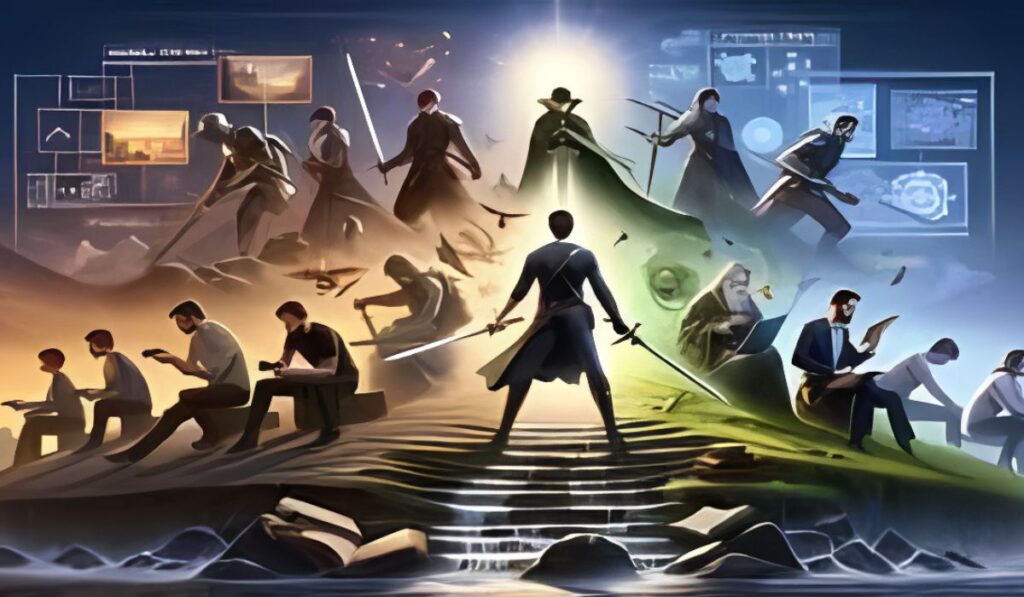Introduction
Video games have become one of the most dynamic forms of entertainment today. With a broad range of genres, it is no wonder that gamers love immersing themselves in different worlds. One game genre that stands out is role-playing games (RPGs). Among these, an emerging trend is the fantasy of “I became a crazy swordsmanship instructor in the game.” This concept captivates players with a unique blend of storytelling, action, and personal involvement.
In this article, we’ll explore what makes this concept so intriguing. Why do players enjoy becoming swordsmanship instructors, and how does it affect their gaming experience?
What is “I Became a Crazy Swordsmanship Instructor in the Game”?
The concept revolves around a character who, instead of being the typical hero, assumes the role of an instructor. In this case, a swordsmanship instructor in a fantasy RPG setting. The term “crazy” doesn’t imply mental instability; rather, it signifies an eccentric or unorthodox approach to teaching swordsmanship. Players are thrust into this role and must navigate the complex tasks of training others while mastering their own skills.
Unlike conventional RPGs where you play the role of the hero, the player is put in the shoes of an instructor responsible for shaping future heroes. This inversion of roles adds an entirely new level of complexity and enjoyment.
The Appeal of Being a Swordsmanship Instructor
So, why would anyone want to be a crazy swordsmanship instructor in a game? The answer lies in the unique gameplay mechanics. In most RPGs, players are used to leveling up their characters and defeating powerful enemies. However, when you play as an instructor, the focus shifts from personal growth to mentoring others. This presents a new set of challenges and rewards.
First, it offers a break from the traditional hero narrative. Instead of being the one in the spotlight, you guide others to greatness. You become a mentor, strategist, and tactician.
Secondly, the role of an instructor often requires players to make critical decisions. These decisions affect not only the gameplay but also the development of other characters. This adds a layer of responsibility and depth that players might not experience in other games.
Unique Game Mechanics
The gameplay mechanics of being a crazy swordsmanship instructor are fascinating. Unlike the usual hack-and-slash style RPGs, this concept often involves intricate training modules. Players must develop training routines, evaluate their students’ progress, and sometimes even fight alongside them to show real-time techniques.
In some games, players are tasked with teaching advanced swordsmanship techniques. This could range from basic stances to high-level combat maneuvers. The game’s difficulty comes in balancing your character’s skills while ensuring that your students improve. If your students fail, it reflects on your abilities as an instructor.
Furthermore, the “crazy” element typically refers to the unorthodox training methods used. This could mean throwing students into impossible battles or forcing them to fight without traditional weapons. These wild methods often lead to better results, but they also add an unpredictable twist to the gameplay.
Why the Role is So Engaging

Becoming a swordsmanship instructor brings a new sense of engagement because it shifts the focus. Instead of simply defeating enemies, players must manage and mentor their students. You become invested in their progress. This type of interaction is rare in RPGs, where individualism usually reigns supreme.
This role encourages problem-solving, creativity, and strategy. The challenge lies in finding the best way to teach each student. Some students may respond well to traditional methods, while others might require more unconventional approaches. The game’s AI often reflects these nuances, making it a complex and rewarding experience.
Another interesting aspect is the freedom the game gives players. They are not confined to teaching one way. Instead, they are encouraged to develop their style. The player can craft training regimens based on their philosophy, making each playthrough unique.
How Does the Game End?
The climax of the game often leads to a major battle or tournament. By this point, your students will either have succeeded in their training or failed. The final challenge tests not only your students’ abilities but also your effectiveness as an instructor.
In some cases, the instructor may even be required to enter the fight to protect their students. This is where the “crazy” element truly shines, as the instructor unleashes hidden, powerful techniques that had previously been kept secret. The player feels a sense of fulfillment, knowing that their hard work has paid off.
The Evolution of Swordsmanship Instructors in RPGs
The idea of being a swordsmanship instructor has evolved in the gaming world. Originally, RPGs centered around the lone hero’s journey. As games became more sophisticated, roles began to shift. Players were no longer confined to being the hero, but could take on roles like merchants, healers, and now, instructors.
In this sense, becoming a swordsmanship instructor is a natural evolution of the RPG genre. It introduces new elements of gameplay that challenge traditional conventions, making it one of the most unique experiences a player can have.
The Role of Storytelling
A significant part of the game’s appeal comes from the story. Players are often introduced to a rich backstory where their character was once a famous swordsman, now retired, and teaching students. The students are often diverse, each with their strengths, weaknesses, and personalities. This creates a dynamic atmosphere where players must adjust their teaching styles according to each student.
The storyline also creates emotional connections. Players get attached to their students, watching them grow and overcome challenges. This bond makes the game not just about mechanics but about character development as well.
The Future of the Genre
As the gaming industry continues to evolve, it’s likely we’ll see more variations of the swordsmanship instructor role. Games could expand to include more detailed training systems, more intricate student interactions, and even co-op modes where multiple players take on different teaching roles. The possibilities are endless.
Moreover, the increasing popularity of simulation and strategy games suggests that roles like swordsmanship instructors will continue to captivate audiences. Gamers love taking on unique challenges, and this role offers a perfect blend of action, strategy, and emotional investment.
FAQs
What makes “I became a crazy swordsmanship instructor in the game” different from other RPGs?
Unlike traditional RPGs, this game focuses on mentorship rather than direct combat. Players must guide and train other characters while managing their growth.
How does the “crazy” aspect of the game manifest?
The “crazy” element typically refers to the unorthodox training methods used by the instructor. These methods are often unpredictable but lead to stronger, more skilled students.
What is the primary challenge of being a swordsmanship instructor?
The primary challenge is balancing your character’s skills while effectively teaching and developing your students. Success depends on your ability to adapt and innovate as an instructor.
Is there a final battle in the game?
Yes, many games feature a climactic battle or tournament where your students’ abilities are tested. The instructor may also participate in this battle to protect their students.
Can the game be played multiple times with different outcomes?
Yes, the game offers multiple playthroughs with different outcomes based on the choices you make as an instructor. Each student’s progress and development depend on your teaching methods, making every game unique.
Conclusion
Becoming a crazy swordsmanship instructor in a game offers an exciting and challenging twist on traditional RPGs. Whether it’s through unique gameplay mechanics, rich storytelling, or the satisfaction of watching your students grow, this concept has firmly established itself as a beloved genre among gamers









































